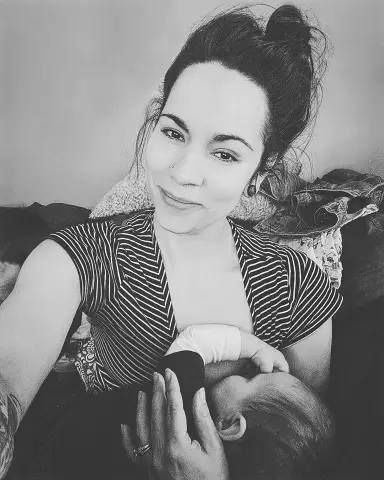- Author Rachel Wainwright wainwright@abchealthonline.com.
- Public 2023-12-15 07:39.
- Last modified 2025-11-02 20:14.
Influenza with breastfeeding

Breastfeeding is the only physiologically adequate form of nutrition for a newborn person. Exclusive breastfeeding is recommended by the WHO due to the importance of breast milk in the formation of the child's immunity, his healthy development, and the normal functioning of his body systems. Breastfeeding includes a chain of complex psychophysiological reactions of the mother and child; its interruption entails complex developmental disorders of the child. Influenza during breastfeeding does not cause breastfeeding to be interrupted. Why is it not advisable to interrupt breastfeeding when the mother is sick? What treatment for influenza during lactation is acceptable? What measures should be taken to prevent influenza during lactation?
Influenza during breastfeeding: mechanisms of infection of the mother's body and immunization of the baby
Many breastfeeding women wonder if it is worth interrupting breastfeeding for various diseases. In the autumn-winter period, the most likely illness is influenza. The female body during lactation is most vulnerable to viral infections of this kind due to the fact that the production of breast milk requires more oxygen, which is an additional burden on the respiratory system. However, influenza while breastfeeding is not an indication to interrupt breastfeeding. Breast milk serves as a natural defense for the child's body. Human breast milk contains a wide range of immunological protective factors. Its immunoglobulins are specific to the pathogens of the child, which is explained by the close contact between the mother and the child,in which bacteria and other pathogenic microorganisms of the child enter the woman's body. The mother's body produces specific "individual" immunoglobulins, which are passed on to the child with breast milk.
Influenza, like any other viral disease, is characterized by a certain incubation period (from the moment the body is infected until the first symptoms of the disease appear), which can range from several hours to 2-3 days. During this period, a breastfeeding woman is already a source of infection for her baby. So, at the time of the manifestation of the infection in the mother, the child has already received the virus with her milk, as well as the necessary antibodies in order for his body to effectively cope with the virus.
Influenza during breastfeeding also does not require such precautions as isolating the baby from the sick mother, wearing a gauze bandage, or boiling breast milk. In the process of boiling, all the components for the natural protection of the child's body are destroyed, most of the vitamins and trace elements contained in breast milk, which affects its nutritional properties. And due to the fact that the infection of the baby occurs long before the manifestation of the first symptoms in the mother, their isolation from each other, as well as the use of gauze bandages upon contact, also makes no sense.
Studies have shown that children who were weaned while their mothers suffered from the flu and other diseases experienced a weakening of the body's defenses, and they were less able to cope with infections later.
Weaning a baby during the mother's flu deprives him of natural protective factors, nutrients, and can also negatively affect the psycho-emotional state of the baby.
During the flu during breastfeeding, it is recommended to feed the child even in severe forms (expressed milk without heat treatment in severe conditions of a woman). Influenza during breastfeeding can affect milk supply, but this is also not a reason to stop feeding. In the process of recovery, the body will resume its previous lactation.
Treatment of influenza during lactation: acceptable drugs, traditional methods of treatment
Influenza during breastfeeding requires a special approach to treatment, since most drugs are incompatible with lactation due to their side effects. Treatment for influenza during lactation does not tolerate independence. When the first symptoms of infection appear, a woman must immediately consult a doctor to confirm the diagnosis and prescribe an appropriate course of therapy. Every medication used to treat the flu should be taken strictly on schedule, in accordance with the baby's feeding regimen. This approach to treatment will help avoid maximum concentrations of active ingredients in breast milk. The regimen for taking medications and breastfeeding should be designed in such a way that the maximum interval is observed between taking medications and the next feeding. Treatment for influenza while breastfeeding involves taking symptomatic medications.
The main symptoms of the flu include:
- Fever - paracetamol is used for its treatment in dosages strictly prescribed by the doctor;
- Sore throat - to relieve this symptom, herbal decoctions, warm tea, warming up, gargling are used;
- Cough - inhalation with herbal decoctions;
- Runny nose - rinsing the cavity with saline solutions.
Any treatment for lactation should be agreed with the attending physician. Symptomatic treatment is based on the use of herbal and homeopathic remedies. Do not forget about traditional methods of treatment: honey, onion drops, salt and iodine solutions.
What is strictly forbidden to do to treat influenza during lactation:
- The use of drugs that are not compatible with lactation, as well as those in the instructions for which there are no notes on the admissibility of taking the drug for the treatment of influenza while breastfeeding;
- Take large dosages of the prescribed drugs with the aim of a speedy recovery. It should be remembered that most drugs are prescribed to alleviate the symptomatic complex, and not to treat the viral infection itself. An increase in the concentration of the drug in breast milk is dangerous for a child.
Prevention of influenza during breastfeeding: basic measures
Everyone knows that disease is easier to prevent than to cure. What are the main measures to prevent influenza while breastfeeding?

In a potentially dangerous period of the spread of viral infections, it is necessary:
- Limit contact with potential sources of infection as much as possible - visiting crowded places (shops, public transport);
- General strengthening of the body and natural vitaminization (vitamin-rich diet for the mother);
- Airing the apartment and maintaining a sufficient level of humidity;
- A healthy lifestyle (good sleep, calmness, activity, staying in the fresh air, getting rid of bad habits, including nutrition). The exclusion from life of factors that adversely affect the state of the body (overeating, unhealthy food, a sedentary lifestyle) contributes to its recovery and strengthening of protective functions;
- Compliance with personal hygiene.
Non-specific methods of prevention of influenza for mother and child will help to avoid contracting a viral infection or to transfer it in a milder form.
YouTube video related to the article:
Found a mistake in the text? Select it and press Ctrl + Enter.






